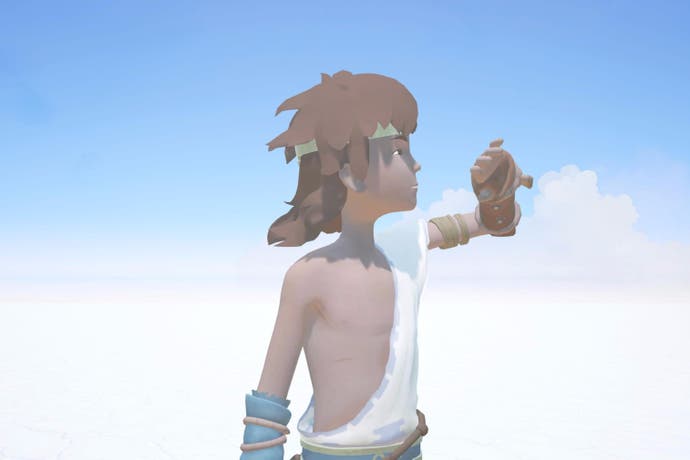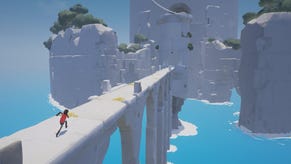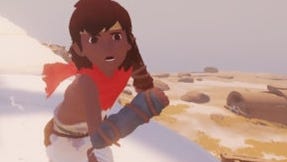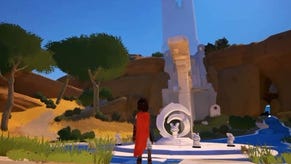Rime review
An atlas of remote islands.
Out of nowhere, I was getting attacked by a bird. A giant bird, with a sharp, bony face and huge talons. A monster that would screech down out of the sky and grab me if I spent too long in the open air. I had a problem with this bird already. Seconds ago, when we first met, this bird had stolen a large golden sphere that I was using as part of a machine that allowed me to shift the sun and moon around in the sky. Without the sphere grinding around in its neat orbital track, I could not control the heavens - and, by extension, the magical shadows the heavens cast on the magical wall of the magical castle I was visiting. Most things are either keys or locks in Rime, but why take the delight out of it? What keys! What locks!
Pursued by the bird, I found myself in a vast stretch of land dominated by three towers. A glyph explained that these towers were weapons for zapping the bird with electricity, and so, spending as little time in the open as possible, I worked my way through each of the towers in turn, collecting keys that would open their front doors - one for the first tower, two for the second - and then coaxing the ancient machinery back to life, one ingenious, playful puzzle at a time.
It was a wonderful dance of ritual and surprise, of expectations confounded and confirmed. Each tower did what I was expecting it to do, but each worked its predictable magic in a way that I had not foreseen. And each tower did all this by operating on a truly massive scale: huge pieces of masonry shook and crumbled, vast shifts in the landscape occurred as I worked. And yet, the question - why did the sky grow darker with every advance I made?
Grand as the scale of the moment was, this was also Rime in microcosm. Rime does the things you expect of this kind of puzzly exploration game, the kind of things you want if you enjoy Zelda dungeons or the intricate, lonely dereliction of an Ico or The Witness. But it does all these things with surprisingly inventive twists. It has a lot of ideas, and they are all wonderfully small, manageable, comprehensible ideas, married to a sense of epic scale that serves as its own reward. A game about other games, but one that is still worth playing in and of itself? Yes, please.
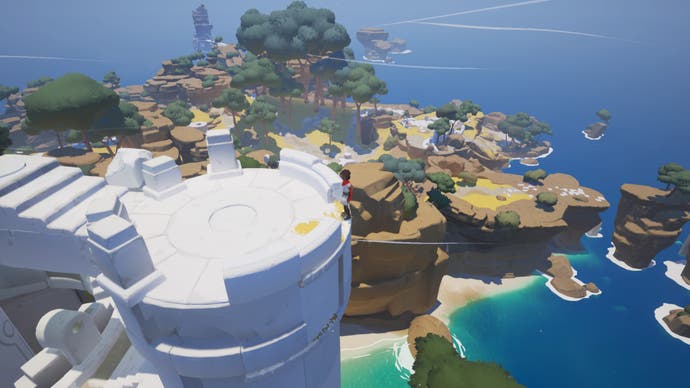
Rime sees you washed up on the shore of a strange, deserted island, a young child alone against the gorgeous wilderness. A tower in the distance, bleached, sepulchral stone with a key motif at the top, seems to beckon you, and as you advance up the beach and steadily work your way inland, two things become immediately obvious.
The first is that this is a place rich in detail: crabs skitter around underfoot, the stiff white peaks of lapping waves give way to foam, and the stones you clamber over convey a sense of weight but also of warmth, all sharp edges worn smooth and rounded by the elements, by the passage of people who have presumably come before you.
The second is that all of this is in service of a landscape that works as a gigantic machine. To put it another way, Rime should be intimidating and exhausting: each of its five levels is generally a huge single place, filled with distinct sights calling to you from the horizon, riddled with passages and opportunities that, if you're like me, you will pass with a sense of dread: so much to remember - so much, potentially, to miss out on. But the scale of all of this stuff is beautifully handled. Rime leads you through its world intelligently and with little of the pressure of a patronising hand on your elbow. After the first painlessly elaborate level, you'll give in to trust: trust that Rime will draw you from one thing to the next in the right order while, magically, allowing you the sense that you are in control. This is an exploration game at heart, a guided tour into an interesting world, where gentle, artful challenge awaits, always in the employ of a team that ultimately wants to leave you delighted and a little dazzled.
There is no combat. And, that bird aside, there are few genuine enemies. Instead, you wander from one ancient landmark to the next and play with the things you find around you. There is range to what at first seems like a pretty but rather anonymous art style - another young protagonist in a cloak scrabbling over rocks, another forgotten tower, another calm sea, measureless to man. But the first level feels distinctly Greek in its use of white and blue paint, in its simple, sun-worn architecture, in its glinting outlining of gold. Next out, we're into the desert with temples carved into soft red cliffs, places that invoke Petra, while the skeletons of ships rest on the sand of a dried out sea - and beyond all that?
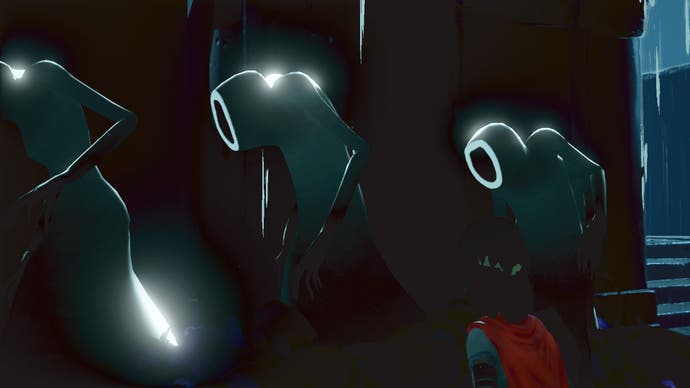
Puzzles encourage playfulness as much as logic. You pull a block to see what happens, you roll one of those golden spheres around in its groove, you peer through the slot in a viewing platform and try to line things up in interesting, unexpected ways. Underpinning many of the challenges - and, really, it's almost as if they're trying to tell you something here - is a manipulation of perspective. How can two disparate things be made into one? What would this or that shape look like from another angle entirely? There's also an emphasis on speech. Besides grabbing things and lugging them around, the child you're controlling can call out, to activate jade statues that might nudge old machines to movement or to spark flickering lamps into sudden flame.
At one beautiful moment you're in the dark, traversing a maze that you cannot see. Okay, minor annoyances: the camera is not always great in confined spaces. But put that aside, and get a load of this puzzle. The ground starts to glow a little whenever you cry out. You can make out the boundaries of the labyrinth that surrounds you, and get a sense of any nearby points where the ground drops away into empty space. Pretty soon, you are crying out constantly as you race around - and pretty soon after that you realise that you are a child, singing in the dark to get yourself through this awful challenge.
Rime is filled with things like that. It has two kinds of pay-off, those that work on a very large scale, Tomb Raider-style, in which ancient tottering robots come to life, in which waterfalls reveal temples lurking behind them. And then it has those that work on a very small scale, that draw you in from the easy spectacle until your attention is retracted to the golden point of a pin, focused on something tiny and human and real. Sometimes, these moments flow together, and at these moments you're not thinking of Rime's slightly anonymous stylings anymore. You're not thinking of whether you're being lead, too willingly, through a beautiful maze. You're just thinking about what's going on around you right now, and wondering how the thing around the next corner is going to top it.
Five levels of this. Well, four and a bit really, but they're all beautifully large and beckoning, and they're filled with distinct ideas that give each sequence a sense of character and identity. The danger with a game like this is padding. Rime has no padding, and yet it took me on an adventure that consumed the best part of two days and left me with a lot to think about afterwards.
This last point is perhaps Rime's greatest trick, in fact. Over time, the facade drops and Rime announces that, actually, it's not just trading in playful Zelda-ish whimsy. It is a game about something - about something genuine and heartfelt and wrenching and delicate. The last few moments of the game - and something that happens right after the game has been completed, if that makes sense - overplay this ever so slightly, an underlining of things that carries a bit of a shock to it, given the subtlety of what has come before. But that's still only a slight annoyance, almost too slight to mention, in the face of something beautiful and daring.
Rime doesn't rely on a twist ending anyway. Rather, this is the twist ending's older and more appealing sibling: the sense of dawning realisation. This game has it all, really. It has a sense of wonder, of poise and, over time, a true sense of emerging character. And it has something to say. Something that is worth hearing.
